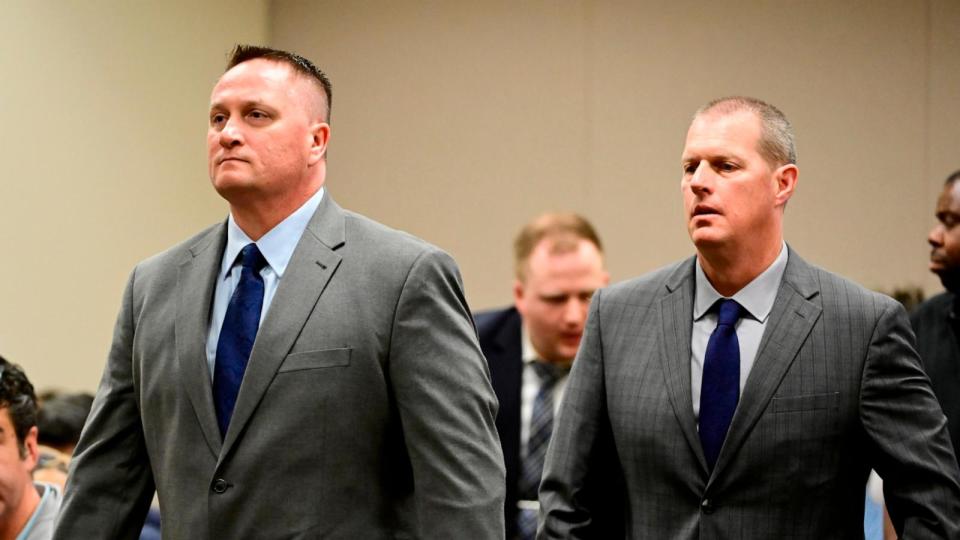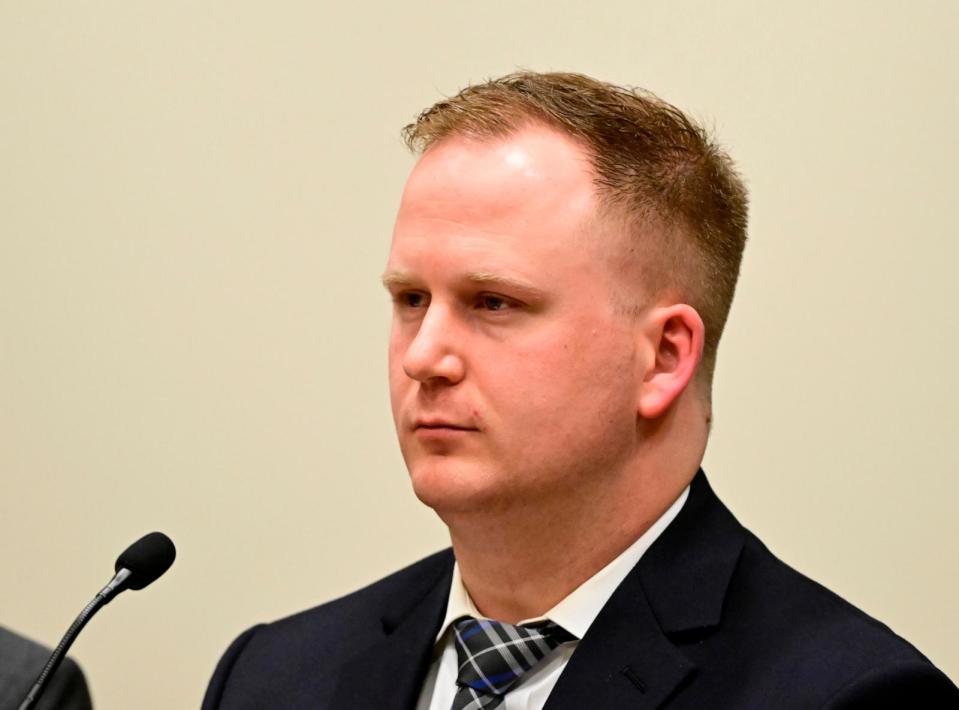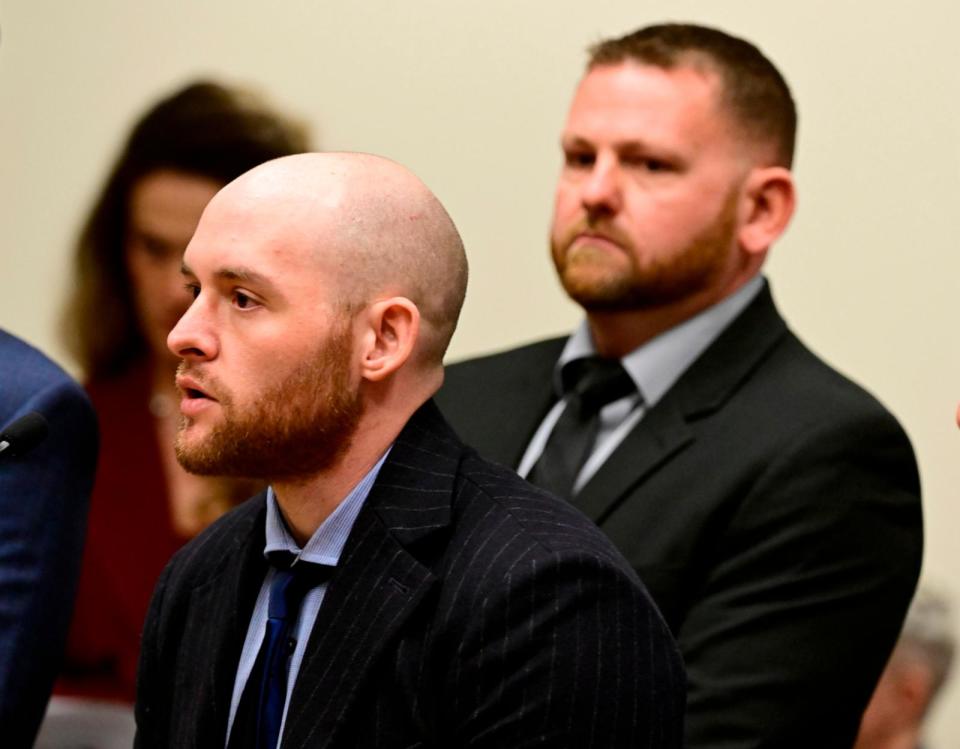Opening arguments begin in trial of 2 paramedics charged in connection with Elijah McClain's death
Paramedics "did nothing" to help Elijah McClain, the 23-year-old Black man who died following a police encounter, according to the Colorado prosecutor who delivered opening remarks in the trial of the two EMTs charged in McClain’s 2019 death.
Jeremy Cooper and Peter Cichuniec were the Aurora Fire and Rescue paramedics who injected McClain with 500 milligrams of ketamine on Aug. 24, 2019, in Aurora, Colorado, after an encounter with police for "rapid tranquilization in order to minimize time struggling," according to department policy.
"They intentionally injected Elijah McClain, who was laying on the ground, barely moving, struggling to breathe, with an overdose of ketamine without following a single step of their training and protocols," the state attorney, Shannon Stevenson, said in opening arguments. "They conducted no assessment. They didn’t speak a word to Elijah. They didn't put a finger on him. And then they overdosed him with 150% of the dose someone his size should have gotten. And then they failed to even check on him until this pulse was gone. They knew better."
Cooper and Cichuniec are charged with criminally negligent homicide, second-degree assault and crimes of violence. Cichuniec is facing an additional charge of manslaughter, according to the indictment. Cichuniec ordered the ketamine, and Cooper injected it into McClain. They have both pleaded not guilty.

Shanna Beggan, Cooper's attorney, argued that he checked McClain’s vitals and confirmed that he had a pulse and could breathe right before administering the ketamine. Michael Lowe, Cichuniec’s attorney, explained to the jury that the reason the paramedics didn’t check his vitals again until he was on the gurney was because of protocol.
"The evidence will show that the reason restraints were needed was because the drugs that are used to sedate these individuals are not 100% effective," Lowe said during opening arguments, explaining that since police told his client that McClain was struggling with them as they arrested him, he could pose a threat if he came back into consciousness. "When someone comes out of sedation, they come out the same way they went under," Lowe said.
MORE: Elijah McClain case: Trial of two officers begins in connection with 2019 death
McClain was stopped by police on his way home from a convenience store after a passerby called 911 to report McClain as acting "sketchy" with a ski mask on, according to prosecutors. However, the caller said there was no weapon and that no one was in danger at the time.
Officer Nathan Woodyard, who was first on the scene, placed McClain in a carotid hold, and he and the other two officers on the scene moved McClain by force to the grass and restrained him, according to the indictment. McClain can be heard pleading with officers in police body camera footage, saying he couldn't breathe.

Cichuniec and Cooper arrived on the scene after McClain was restrained and in handcuffs, according to the indictment.
The state attorney played the body camera footage of McClain’s last words before his death during opening arguments. "Stop please. … I’m trying. … Please help me," words the prosecutor said Cooper and Cichuniec heard McClain say.
Lowe argued that as soon as they noticed McClain didn’t have a pulse in the ambulance, they began life-saving measures.
MORE: Elijah McClain's death: Cop acquitted in 2nd trial of police officers
"They don't stop when they get to the hospital. They watched the entry into the hospital. There was an AFR (Aurora Fire Rescue) employee on that person's chest," Lowe said. "Giving Elijah McClain CPR all the way into the hospital, all the way into the emergency room."
McClain was declared brain-dead days later and died on Aug. 30, 2019.
Cooper and Cichuniec diagnosed McClain with excited delirium, after approximately two minutes on the scene, according to the indictment. Stevenson explained to the jury that the only time paramedics are allowed to administer ketamine is if the patient is suffering from excited delirium and is a danger to themselves and others.
McClain was handcuffed, held on the ground by multiple officers and did not pose a threat to anyone, according Stevenson. McClain weighed 143 pounds (65 kg) and as such his weight-based ketamine dose should have been closer to 325 mg of ketamine, rather than the 500 mg injected into the 23-year-old, Stevenson said.
McClain's cause of death, which was previously listed as "undetermined," was listed in an amended autopsy report as "complications of ketamine administration following forcible restraint." The manner of death remained listed as "undetermined" as it was in the initial report.
"They're being told by law enforcement that this person has been fighting all of them," Beggan said when explaining why the paramedics chose to give him ketamine. "They're being told he has done a push-up with three of them on him, over 700 pounds of men on him. They're being told he's been completely resistant to pain control. They're being told he went for a gun. They're being told that he's completely nonsensical. He speaks English, but he's not making any sense. [They were told] he's clearly on something."
During Woodyard's trial, his defense attorneys argued the ketamine administered by the paramedics that night was responsible for McClain's death. Woodyard was acquitted by a jury on all charges earlier this month and has since been reinstated to the Aurora Police Department under uniform-assignment restricted duty, according to police officials.
In the first trial in connection with McClain's death, officer Randy Roedema was found guilty on Oct. 12 of criminally negligent homicide and assault in the third degree. He will be sentenced in January 2024, and could face up to five years in prison and be fined more than $100,000. His employment with the police force was terminated following his conviction.

Another officer, Jason Rosenblatt, was found not guilty on charges of reckless manslaughter, assault in the second degree, and criminally negligent homicide in October. His employment with the police force was terminated in 2020.
The trial for Cichuniec and Cooper will be the last set of criminal charges to be tried by Colorado’s attorney general, according to an indictment.
"It wasn’t just careless and sloppy. It was cruel," Stevenson said about Cichuniec's and Cooper's actions while on the scene of McClain’s arrest. "It showed a total disregard for Elijah McClain, their patient, a person. Elijah McClain would have been better off if they had never come. He would have been alive if they never come."
"They walked into a situation that they literally had minutes to make a decision, follow a protocol and do what they needed to do for Elijah McClain," Lowe said.
ABC News' Aisha Frazier contributed to this report.
Opening arguments begin in trial of 2 paramedics charged in connection with Elijah McClain's death originally appeared on abcnews.go.com


